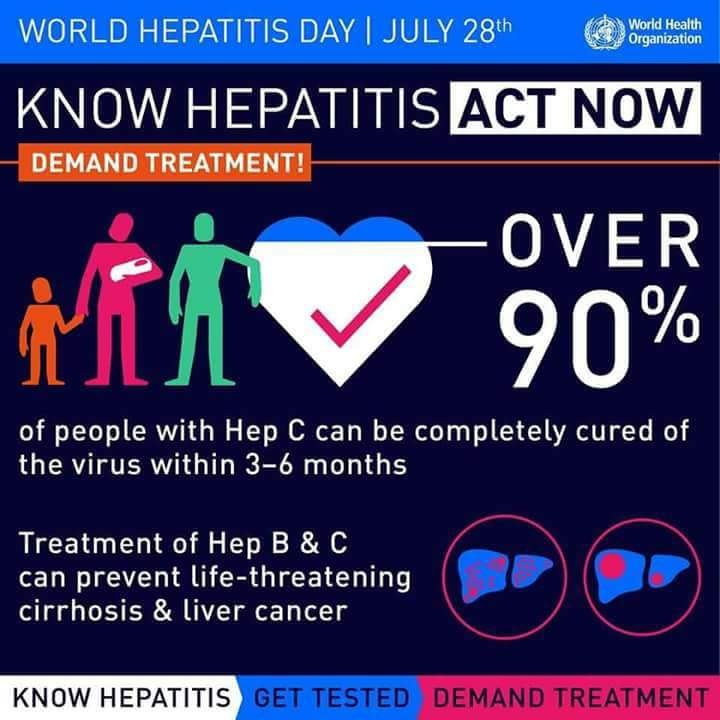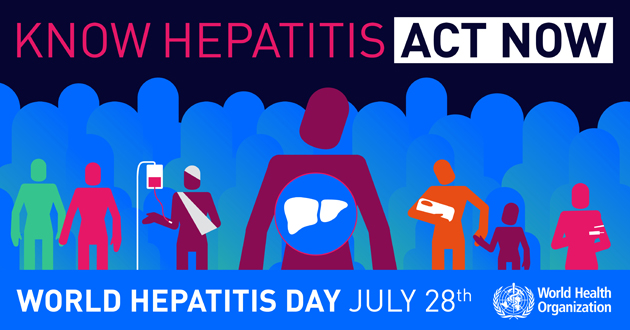Viral hepatitis, which is hepatitis A, B, C, D, and E, is a heavy burden on global health. Acute hep-B and C account for 2.7 percent of deaths around the world. While 2 percent may seem like a small percent of the world, that’s more people than the entire redhead population of the globe and more than eight times the population of Australia. More than half of all cases of liver cirrhosis and 78 percent of all cases of liver cancer are caused by hepatitis B and C.
Hepatitis is a burden on health worldwide. In 2013, it was the leading cause of death worldwide! Luckily WHO wants to eliminate hepatitis B and C by 2030. Even though you may not give it very much thought on a day-to-day basis, here is a little bit of information on a major health crisis this World Hepatitis Day, July 28th: 
Types of Hepatitis:
Hepatitis is inflammation of the liver. Viruses cause most forms of hepatitis, and those forms of hepatitis are named by the viruses that cause them (ex. hepatitis A, B, etc). Some people have no symptoms, but many people have jaundice, stomach pain, or diarrhea.
Hepatitis A
Hepatitis A is a virus spread by the ingestion of very small fecal particles of an infected person, usually in food or water. You can be vaccinated for hepatitis, and since the vaccine was released in 1995, rates have dropped by 95 percent. The vaccine appears to be effective for a person’s whole lifetime. Getting vaccinated is your first line of defense against hepatitis. If you cannot get vaccinated, clean drinking water, washing fruits and vegetables, and washing your hands are an important part of staying hepatitis A free.
As countries develop sustainable water sources for their citizens, treating that water to avoid hepatitis A and other waterborne illnesses should be an important focus. When combined with vaccination availability, hepatitis A could be greatly reduced worldwide.
Hepatitis B
Hepatitis B is the most serious form of hepatitis. Luckily, like hepatitis A, a vaccine is available. This form of hepatitis is spread through bodily fluids and can survive out of the body for seven days! Vaccination is the first line of defense from hepatitis B, but like other bloodborne pathogens, preventative measures like properly handling bodily fluids, can be followed to prevent hepatitis B.
Hepatitis B is of slightly more urgency than hepatitis A, since it poses a more serious risk. Preventative measures like vaccination availability is vital. It is also vital to provide training in high-risk areas where proper handling of needles and hazardous waste could see big benefits.
Hepatitis C
Unlike hepatitis A and B, hepatitis C has no vaccine. So prevention and treatment are hugely important. It is also very important to get tested, since catching hepatitis is a big part of successful treatment for it. Tattoos and intravenous drug use play a big part in hepatitis C transmission in developed nations.
The front line of hepatitis C research is in Egypt, which has the highest rate of hepatitis C in the world. The prevalence of hepatitis C in Egypt is because of improperly cleaned needles in the early 1900s when Egypt treated schistosomiasis. Egypt’s large-scale treatment plan shows that hepatitis C can be treated if medical care is made available to people.
Hepatitis D
Hepatitis D is a sub-virus of hepatitis B. The vaccine against hepatitis B works to prevent hep-D, since hep-D needs hep-B in order to reproduce.
It is one of the most dangerous forms of hepatitis, since it means that you have two forms of hepatitis, and kills 20 percent of people inflicted.
Hepatitis E
Hepatitis E, like hep-A, is spread through the fecal-oral route. It is important to insure reliable, safe water sources are available to people to prevent hep-E. For most people, the virus resolves itself, although in immunocompromised people, it can be dangerous.
What Can You Do About Hepatitis?
There are a variety of things you can do to prevent the various forms of hepatitis. Many of the preventative measures are cost-prohibitive for poor countries and people.
Mary Grace, an independent liberal from the United States, lives in the beautiful Boise, Idaho, and adores her mountains. She loves skiing, hiking, and repairing vintage bicycles. If you want to chat, or have any questions, feel free to tweet her @marmygrace, or send her an email marmgrace@gmail.com

